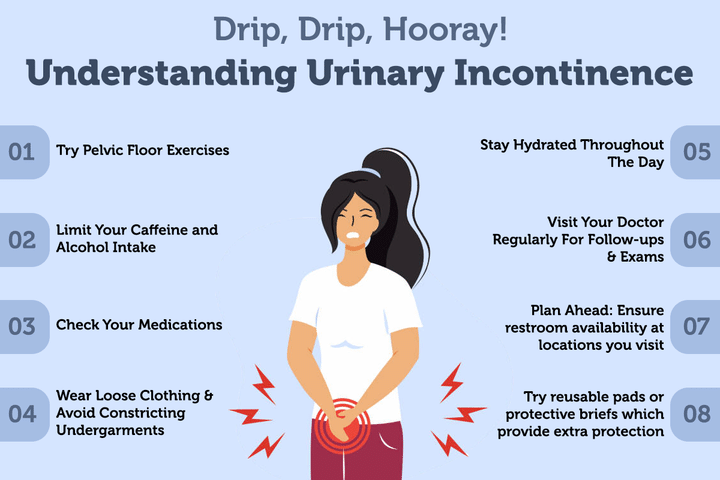Get the App
For Doctors
Login/Sign-up
Last Updated: Mar 07, 2024
BookMark
Report
8 helpful tips for managing urinary incontinence
Dr Ankit KayalUrologist • 18 Years Exp.MBBS, MS - General Surgery, MCh - Urology/Genito-Urinary Surgery
What is Urinary Incontinence?
Urinary incontinence is the unintentional loss of urine. It is a common problem among all age groups, though it occurs more frequently in older people, and women are affected more than men.
It can be caused by physical problems such as weak bladder or neurological disorders, or it can be the result of certain lifestyle habits and conditions. Treatment for urinary incontinence will depend on the type and severity of your condition, but may involve lifestyle adjustments, medications, surgery or devices like catheters.
What are the signs and symptoms of Urinary Incontinence?
The most common signs and symptoms of urinary incontinence include:
- Unexpected or frequent leakage of urine while coughing, sneezing, laughing, exercising or engaging in other activities
- Difficulty making it to the bathroom in time
- A strong and sudden urge to urinate followed by an involuntary loss of urine
- Inability to control the release of urine
- Urinating frequently (more than 8 times a day)
- Small amounts of urine being released with no warning or sensation
- Waking up several times at night to urinate
- Leakage during sexual intercourse (especially for female patients).
What are possible complications of Urinary Incontinence?
- Bladder Overactivity: Urinary incontinence is often caused by an overactive bladder, which means that the bladder muscles contract and release urine before you•re be prepared to urinate. This can lead to an embarrassing and bothersome leakage of urine.
- Irritable Bladder Syndrome: Some people experience frequent, uncontrollable urge to urinate due to irritation or inflammation in the bladder or urethra, even when their bladder is empty. This condition can cause frequent episodes of urinary incontinence.
- Anxiety: Emotional stress related to anxiety can lead to overactive muscles that control urinary function, and in some cases cause urinary incontinence. This can be frustrating for many people who have trouble managing their stress levels correctly, yet find themselves dealing with unwanted leaking urine as a result.
- Weakened Pelvic Muscles: Many women experience weakened pelvic floor muscles as a result of childbirth, age, hormonal changes or injury which can contribute to urinary incontinence without proper strength training for these muscles regularly exercised and strengthened in form of weight lifting or regular Kegel exercises .
- Infection: Bacteria from a bladder infection may travel up the urethral tube causing inflammation which may lead to some degree of random urinary incontinence until the infection is treated correctly antibiotics prescribed by doctor .
- Other Factors/Conditions: Neurological conditions such as stroke, multiple sclerosis (MS) or other nervous system problems can interfere with nerve signals between the brain and the bladder leading even more loss of control of your urinary functions resulting ranging from mild leaking episodes all way total loss of control during episodes dizziness fatigue releasing large volumes TMI rest this blurting urine involuntarily .
8 helpful tips for managing urinary incontinence
- Try Pelvic Floor Exercises: Pelvic floor muscle exercises, also known as Kegel exercises, are a great way to strengthen the muscles that support your bladder and help control urinary incontinence.
- Limit Your Caffeine and Alcohol Intake: Drinking too much caffeine (in coffee, tea or soda) or alcohol can worsen your symptoms of urinary incontinence as both irritate the bladder. Cut back on these items as much as possible.
- Check Your Medications: Speak to your doctor about any medicines that are causing you trouble with urinary incontinence. Some medications can create a strong urge to urinate or cause excessive urine production which can lead to incontinence episodes.
- Wear Loose Clothing & Avoid Constricting Undergarments: Sporting tight-fitting clothing and undergarments can put extra pressure on your bladder, making it harder for you to control urine leakage and cause more frequent trips to the toilet.
- Stay Hydrated Throughout The Day: Staying hydrated is important not only for overall health but also maintaining healthy bladder functioning with urinary incontinence management in mind! Drinking enough water will help ensure regular trips to the bathroom but don’t overdo it – Too much water is always a bad idea if you’re already dealing with overactive bladder problems!
- Visit Your Doctor Regularly For Follow-ups & Exams: Consistent follow-ups will help you track progress and be aware of any changes in symptoms over time! And depending on age/other factors, some types of exams may need scheduling for better management of urinary incontinence treatments alongside medication uses – so don’t forget about those visits!
- Plan Ahead: Especially if you have social engagements coming up such an evening out – Make sure to plan ahead by considering restroom availability around those locations prior just in case of uncontrollable urges or unexpected dribbles.. Always remember that it doesn’t hurt to be overly prepared!
- Try Other Incontinence Products/Assistive Devices : In addition various medications/manual exercises - there are other noninvasive treatments such as using specialised undergarments like reusable pads or protective briefs which provide extra protection against unexpected leaks.
- Disposable absorbent pads are available too if more flexibility is needed during activities where constantly changing attractive clothing becomes impractical
- Ayurvedic remedies include drinking herbal teas, such as fenugreek tea or coriander tea; taking herbal oils and ointments; and consuming certain plants, such as Indian pennywort or bael tree. Ayurvedic practitioners may also suggest doing abdominal strengthening exercises and other yoga poses that promote urinary control such as standing twists, boat pose, bow pose, and cobra pose (bhujangasana).
What are the surgical treatments for Urinary Incontinence?
Surgical treatments for urinary incontinence include:
- Artificial Urinary Sphincter (AUS): An AUS is a device that is surgically placed around the bladder neck and urethra to help close off the urethra and reduce leakage of urine.
- Slings: slings can be placed under the urethra to provide support and reduce incontinence by lifting the bladder neck.
- Bulking Agents: Bulking agents can be injected into the wall of the urethra to widen it, creating a stronger seal against urine leakage.
- Ablation: Ablation is an outpatient procedure that uses energy waves to treat tissue in order to reduce discomfort and improve symptoms of overactive bladder.
- Sling Procedures: slings are tiny pieces of surgical mesh installed under the urethra, which provide support and increase pressure on it, reducing urine leakage incidence.
- Prostatic Urethral Lift (PUL): PUL is a minimally invasive procedure that manoeuvres parts of the prostate up and away from the bladder neck in order to improve bladder emptying and decrease urinary leakage episodes.
Best doctors to consult for Urinary Incontinence?
- Urologists are the best medical practitioners to consult for urinary incontinence as they specialise in issues related to the urinary tract.
- Other medical professionals who can be consulted include gynaecologists (if urinary incontinence is related to pregnancy or menopause), physical therapists, and even primary care physicians depending on the type or severity of the condition.
In case you have a concern or query you can always consult a specialist & get answers to your questions!



+1.svg)
